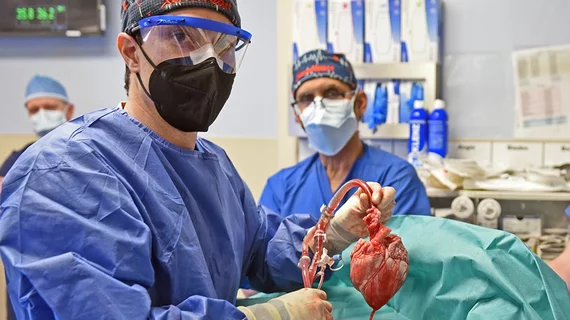Specialists from the University of Maryland Medical Center (UMMC) in Baltimore made history in January when they transplanted a genetically modified pig heart into a human patient for the very first time. Now, the Heart Failure Society of America (HFSA) has announced that some of those same providers will be featured speakers at the HFSA Annual Scientific Meeting 2022 (ASM) in October.
Bartley P. Griffith, MD, the original surgeon who transplanted the pig heart, Muhammad M. Mohiuddin, MBBS, program director of UMMC’s cardiac xenotransplantation program, and Susan Joseph, MD, an associate professor of medicine at UMMC, are all scheduled to participate in a plenary session, “Cardiac Xenotransplantation: Where we are and where we are going,” on Monday, Oct. 3.
Savitri Fedson, MD, MA, an associate professor from the Center for Medical Ethics and Health at Baylor College of Medicine, will also participate in the session.
“We are absolutely thrilled to have the team behind one of the most innovative, and groundbreaking cardiovascular achievements be able to share this with us at ASM,” David Lanfear, MD, MS, ASM Program Chair and Head of Advanced Heart Failure and Transplantation at Henry Ford Hospital, said in a statement. “Their incredible work is paving the way to a future of adequate access to heart transplantation for all patients. I foresee this being one of our most popular and highly anticipated sessions at ASM.”
A bit of context on the historic pig heart transplant
The historic pig heart transplant took place on Jan. 7. The patient, 57-year-old David Bennett, died on March 8, two months after the transplant. UMMC published a statement at the time, calling Bennett a “brave and noble patient who fought all the way to the end.”
Bennett appeared to have momentum after the procedure, Griffith and colleagues shared in the New England Journal of Medicine. He was quickly weaned off of extracorporeal membrane oxygenation (ECMO), for instance, even though he needed ECMO to stay alive before receiving the new heart. UMMC even sent out a hopeful update in late February, noting that Bennett watched Super Bowl LVI between the Los Angeles Rams and Cincinnati Bengals and even sang along with “America the Beautiful.”
However, Bennett’s condition quickly took a turn for the worse. Griffith et al. have shared that the primary cause of death appears to be heart failure. They did not see any signs that Bennett’s body had rejected the genetically modified pig heart.
“We consider this to be an important learning experience,” Mohiuddin said in June. “Knowing what we know now, we will alter some of our practices and techniques in the future.”

